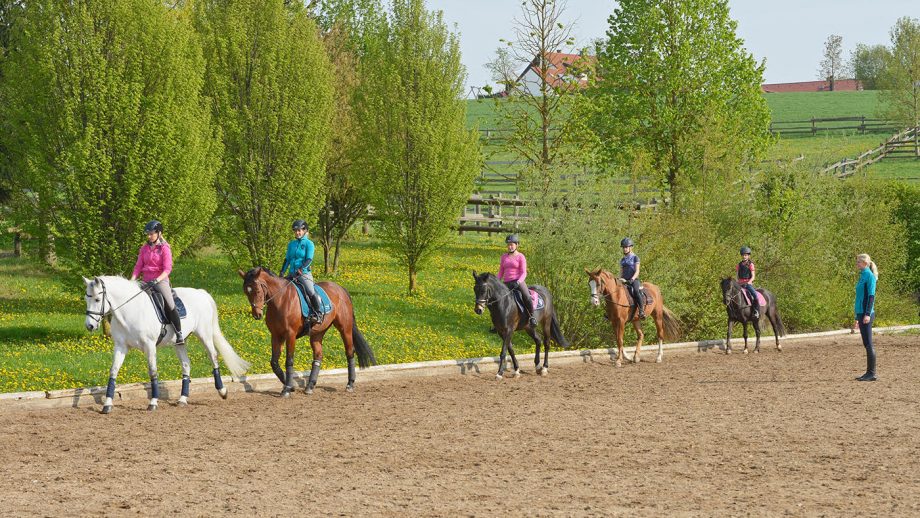Britain’s riding schools are “on the brink of a disaster” and the future is a “frightening prospect” unless action is taken, leading figures have warned following fresh research.
Last year, the health of riding establishments research conducted by British Equestrian (BEF) and its member bodies highlighted a “supply and demand predicament” faced by riding centres (news, 22 September 2022). It found that establishments were running on average at 75% capacity owing to issues around workforce, horsepower and costs. One year on, the survey has been repeated and findings show little change.
“Across Britain, riding schools are operating in an increasingly struggling sector, and an already precarious situation has been exacerbated first by the pandemic and now by the cost-of-living crisis,” said Mandana Mehran Pour, BEF’s head of participation.
“Put simply, our equestrian establishments are on the brink of a disaster and traditional delivery models are under threat if we don’t find ways to address the issues.
“If workforce and horsepower issues could be resolved, many centres could be operating at 100% capacity.”
The British Horse Society (BHS), the Association of British Riding Schools (ABRS+), The Pony Club, the Riding for the Disabled Association and Horsescotland worked with the BEF on the survey. Operating capacity levels are mirrored one year on, with 70% of centres saying they would like to up capacity but are struggling to do so. The workforce shortfall, including paid staff and volunteers, is a significant issue. A total of 55% of centres said the cost-of-living crisis has worsened capacity problems.
But there is optimism among centres, many of whom are diversifying business models to keep people engaged and make additional money.
A cross-industry working group is tackling licensing. Progress is also being made on supporting centres with business development, marketing, funding, keeping riders engaged through non-ridden activities, and staff and volunteer management.
“We are at a time-critical point for many of our riding establishments and we need to do everything possible to prevent further closures,” said Ms Mehran Pour. “Their resilience and optimism are commendable, but there is only so much they can do single-handedly and we have already proven the value of collaborative working within our member bodies to achieve results.”
BHS chief executive James Hick said that demand to attend a riding school and connect with horses “has never been stronger, with most centres reporting a waiting list of 50 clients or more”.
“But without the qualified coaches and yard staff needed to run these centres, this demand is just not going to be fulfilled,” he said. “This is such a frightening prospect. We need to acknowledge how important spending time with horses is for our mental health and overall wellbeing.”
George Baber, ABRS+ director of member services and operations, told H&H that “not all, but a good number” of riding schools are “struggling to make ends meet”.
“It’s a mixture of rising costs, which have an impact both on customers because they can afford less, and on [the schools’ own] internal costs. There’s a sector within the riding school environment that’s definitely struggling,” he said. “We’ve had a number of ABRS+ schools close, or convert to livery yards, because they either can’t get workforce or can’t get horses, or simply because the equation doesn’t seem to work out for them financially. So there’s no doubt that grassroots riding has suffered, and continues to suffer.”
He added there is another side too – in the past riding schools have closed and been replaced with new ones opening. While they have seen some replacements, helped by the new ABRS+ category to prepare them for licensing, they are not seeing the same volume as previously.
“We have to start from the basis that every riding school is its own business,” said Mr Baber. “So when we’re looking at them as a group, we’re looking at the things that might be enablers, to help schools be more sustainable into the future.”
Positive impact of city riding centres
A new study has highlighted the “overwhelming” positive impact urban equestrian centres have on their local area.
The BEF worked in partnership with the Sport and Recreation Alliance on the project, which involved 13 centres.
Researchers found that “sense of community, social outcomes, and the benefits to physical and mental wellbeing were frequently cited” in interviews, and the community feel translates into a strong volunteer culture. And while “each centre is successful in its own way”, the survey found that “what connects them as a common attribute is the passion and desire to make a difference through horse riding”.
But establishments reported that some of the issues highlighted in the health of riding establishments research are compounded by their location.
“If we are to be successful in tackling inequalities in access to physical activity in the form of riding, we must understand how those delivering in the community operate and the challenges they face,” said Ms Mehran Pour.
- The ABRS+ is hosting a free webinar with Ms Mehran Pour at noon on 23 October, to cover the survey results and actions being taken
What do you think? Send your thoughts to hhletters@futurenet.com, including your name, nearest town and country, for the chance for your letter to be included in the magazine
You might also be interested in:

Subscribe to Horse & Hound magazine today – and enjoy unlimited website access all year round

Action planned on supply, demand, costs and licensing issues faced by our riding schools

‘A dying breed’: riding schools speak out as they face toughest time yet
Horse & Hound magazine, out every Thursday, is packed with all the latest news and reports, as well as interviews, specials, nostalgia, vet and training advice. Find how you can enjoy the magazine delivered to your door every week, plus options to upgrade your subscription to access our online service that brings you breaking news and reports as well as other benefits.




